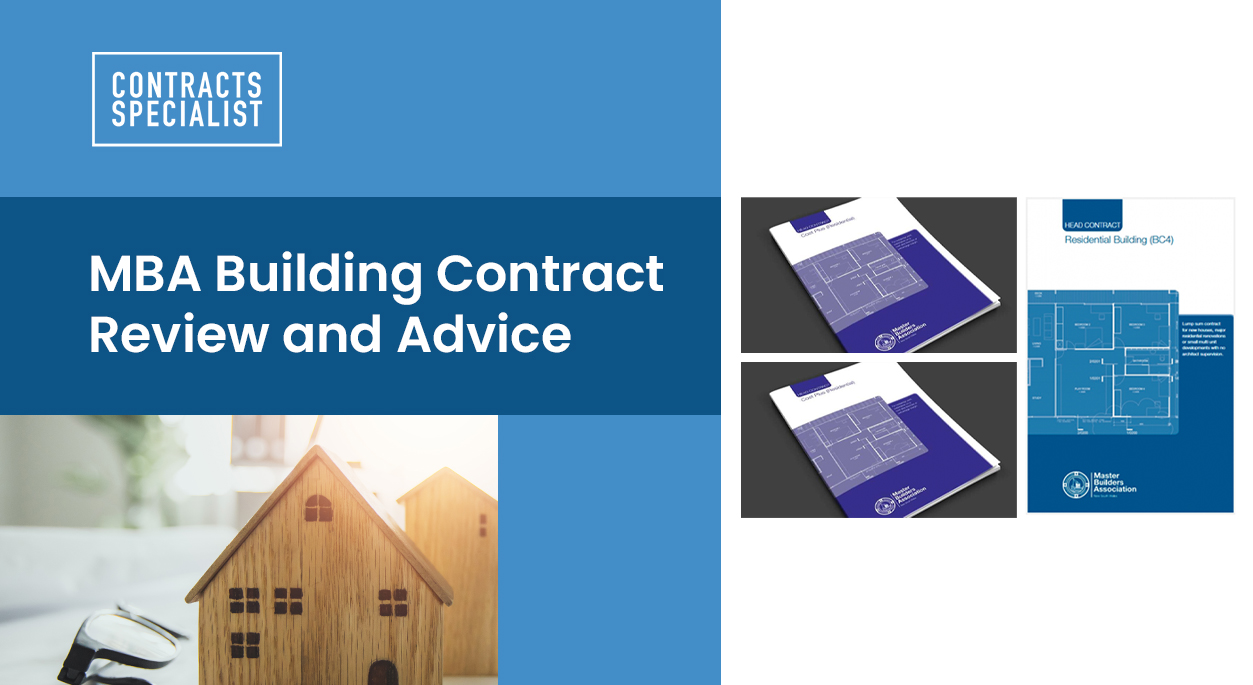MBA and their Contracts
In the construction industry, master builders play a significant role in delivering high-quality projects. A master builder refers to a builder who holds membership in the esteemed Master Builders Association (MBA). The MBA is an organization that represents and advocates for the interests of the building and construction industry. With associations present in various Australian states and territories, the MBA provides essential services and support to its members.
The primary purpose of the Master Builders Association is to promote excellence and professionalism in the building and construction sector. They offer a range of services that include training, contracts, industrial relations, workplace health and safety, and adherence to building codes and standards. Additionally, the MBA provides valuable legal services to its members, ensuring they have access to expert advice and guidance throughout their projects.
To become a master builder, builders must meet specific educational and training qualifications required by the MBA in their respective state or territory. Furthermore, they are expected to continually enhance their skills and knowledge through additional training and accreditation. Master builders can be both small and large companies, specializing in either commercial or residential projects. They are held to a high standard of expertise and must adhere to a strict Code of Conduct.
Master builders possess in-depth knowledge of relevant laws, regulations, and codes governing the building industry. Their expertise allows them to deliver projects with the utmost professionalism, ensuring compliance with legal requirements and industry standards.
Advantages of Master Builders Contracts
Master builders contracts offer several advantages for both builders and project owners. Let’s explore the key benefits of utilizing these standardized agreements:
Clear and Specific Obligations: Master builders contracts provide a clear and detailed framework that outlines the rights, responsibilities, and obligations of all parties involved in the construction project. By clearly defining the scope of work, timelines, payment terms, and dispute resolution procedures, these contracts help mitigate potential misunderstandings and disputes.
Inclusion of Relevant Building Laws and Regulations: Master builders contracts are regularly updated to incorporate the latest building laws, regulations, and industry standards. This ensures that the contract reflects the legal requirements specific to the construction industry. By incorporating these provisions, master builders contracts help builders and project owners comply with the applicable legal framework.
Familiarity and Industry-Wide Recognition: Master builders contracts are widely recognized and commonly used within the construction industry. Builders, subcontractors, suppliers, and project owners are often familiar with these standardized contracts, which streamlines communication and understanding between parties. This familiarity reduces the need for extensive negotiation and customization, saving time and effort.
Time and Cost Savings: Utilizing master builders contracts can result in potential time and cost savings compared to creating custom contracts from scratch. Since these contracts are readily available and encompass industry-specific provisions, they eliminate the need to draft complex agreements from the ground up. The standardized nature of master builders contracts helps expedite the contracting process, enabling builders and project owners to commence construction sooner.
By leveraging the advantages offered by master builders contracts, construction projects can benefit from enhanced clarity, legal compliance, industry recognition, and streamlined processes. However, it is important to note that these contracts may still require customization with special conditions to adequately allocate risks and address project-specific considerations.
What is a Master Builders Contract?
Master Builders Association (MBA) contracts refer to the standardized construction agreements developed and provided by the MBA. These contracts are specifically tailored to meet the needs of builders and project owners within the construction industry.
The MBA contracts are designed to ensure fairness, clarity, and legal compliance in construction projects. They outline the rights, obligations, and responsibilities of all parties involved, providing a structured framework for project execution.
It is important to differentiate MBA contracts from contracts offered by other industry organizations, such as the Housing Industry Association (HIA). While both the MBA and HIA offer standardized contracts, there are key differences between them.
MBA contracts are developed by the Master Builders Association and are recognized and widely used within the construction industry. They reflect the specific needs and requirements of builders and project owners, taking into account applicable building laws and regulations.
On the other hand, HIA contracts are prepared by the Housing Industry Association, another prominent organization in the construction sector. HIA contracts are tailored to address the unique considerations of residential construction projects. These contracts may have their own provisions and specifications that differ from those found in MBA contracts.
While both MBA and HIA contracts provide standardized templates for construction agreements, builders and project owners should carefully review and select the contract that best suits their specific project requirements. Consulting with legal professionals who are well-versed in construction law can provide valuable guidance in choosing the most appropriate contract for a given project.
Related Contents: HIA Contract for Residential Building
Types of Contracts in the MBA


Enhance Your Contract Management with HBApp
Master Builders contracts are fundamental in the construction industry, outlining both parties’ crucial obligations and rights. HBApp can significantly streamline the management of these contracts, ensuring efficient compliance and effective project execution.
Title for Key Features and Benefits of HBApp: Empowering MBA Contract Management with HBApp's Innovative Features
- Streamlined Document Organisation: HBApp simplifies the management of Master Builders contracts by providing a centralised platform for document storage, organisation, and easy access.
- Risk Management Tools: Navigate the complexities of contract compliance with HBApp’s risk management features, minimising potential disputes and ensuring smooth project progression.
- Efficient Task Allocation: With HBApp, assign and track tasks related to contract obligations, ensuring all project aspects align with the Master Builders standards.
The Master Builders Association (MBA) offers a diverse range of contracts to accommodate different types of construction projects. Let’s explore the various contract types available through the MBA and understand their specific uses:
Commercial Contracts:
Commercial contracts provided by the MBA are designed for projects in the commercial sector, including office buildings, retail spaces, and industrial facilities. These contracts can be further classified into two main types:
a. Lump Sum Basis Contracts:
Lump sum contracts establish a fixed price for the entire project. The builder agrees to complete the construction for the agreed-upon sum, covering all materials, labor, and associated costs. This type of contract provides cost certainty for project owners.
b. Cost-Plus Basis Contracts:
Cost-plus contracts involve the reimbursement of the builder’s actual project costs, including materials, labor, and overhead expenses. In addition to the costs, the builder receives an agreed-upon percentage or fee as profit. Cost-plus contracts offer flexibility in project scope and changes, allowing for adjustments based on unforeseen circumstances.
Residential Contracts:
The MBA offers residential contracts specifically tailored for different value threshold levels. These residential construction contracts are used in projects, such as houses, apartments, or townhouses. The residential contracts cater to the unique considerations of residential construction, including homeowner protections, warranty provisions, and other residential-specific requirements.
Subcontracts:
Subcontracts are contracts between the builder and subcontractors who provide specialized services or trades within a larger construction project. The MBA also provides standardized subcontract templates to establish clear terms, obligations, and payment conditions for subcontractors.
Each contract type serves a specific purpose and addresses the requirements of different construction projects. Builders and project owners should carefully evaluate their project needs and consult with legal professionals to select the most suitable contract type from the MBA offerings.
Cost-Plus Contracts
Cost-plus contracts are a specific type of contract within the master builders context. Let’s explore the definition, purpose, operation, and key considerations associated with cost-plus contracts:
Definition and Purpose:
Cost-plus contracts are construction agreements where the builder is reimbursed for the actual project costs incurred, in addition to an agreed-upon percentage or fee as profit. The purpose of a cost-plus contract is to provide transparency and flexibility, particularly in projects where the scope of work may evolve or change over time.
Operation of Cost-Plus Contracts:
In a cost-plus contract, the builder is responsible for maintaining accurate records of all project-related expenses, including materials, labor, equipment, and subcontractor costs. The project owner then reimburses the builder for these costs based on the documented evidence. Additionally, a predetermined percentage or fee, often agreed upon at the contract’s inception, is added to the reimbursed costs as the builder’s profit.
Benefits of Cost-Plus Contracts:
- Transparency: Cost-plus contracts offer transparency by providing a detailed breakdown of the project costs. This transparency allows project owners to verify expenses and ensures an open book approach to financial matters.
- Flexibility: Cost-plus contracts are beneficial in projects where the scope may change or unforeseen circumstances arise. The flexibility allows adjustments to the project as necessary without the need for extensive contract modifications or disputes over additional costs.
- Incentive for Cost Control: Since the builder’s profit is tied to the actual costs incurred, cost-plus contracts incentivize builders to control expenses and seek cost-effective solutions without compromising quality.
- Collaboration: Cost-plus contracts foster a collaborative relationship between the builder and the project owner. Both parties work together to manage costs and make informed decisions, resulting in a higher level of trust and cooperation.
Related Contents: Master Builder Cost Plus Contract in NSW
Considerations for Cost-Plus Contracts:
- Defined Parameters: It is essential to establish clear parameters within the cost-plus contract, including how costs are documented, approved, and reimbursed. This ensures transparency and avoids disputes related to excessive or unauthorized expenses.
- Open Communication: Effective communication and ongoing collaboration between the builder and project owner are crucial in cost-plus contracts. Regular updates on project costs, progress, and potential changes should be maintained to ensure mutual understanding and alignment.
- Risk Allocation: As with any construction contract, risk allocation is an important consideration. It is essential to clearly define the responsibilities and liabilities of each party within the cost-plus contract to ensure a fair distribution of risks.
By leveraging the benefits of cost-plus contracts, builders and project owners can navigate projects with changing scopes and maintain transparency throughout the construction process. However, it is recommended to seek legal advice and customize the cost-plus contract to address project-specific considerations and risk allocation.
Master Builders Contracts in Specific Regions
Master builders building contracts can vary based on the region where the construction project takes place. Let’s focus on master builders building contracts in New South Wales (NSW) and provide an overview of the specific considerations and regulations applicable in this region.
- Master Builders Building Contracts in NSW: In NSW, the Master Builders Association (MBA) offers a range of building contracts tailored to the unique requirements of construction projects within the state. These contracts provide standardized templates that align with NSW building laws and regulations.
- Specific Considerations and Regulations in NSW: When entering into a master builders building contract in NSW, it is important to take into account the following:
a. Licensing and Accreditation: Builders operating in NSW must hold the appropriate licenses and accreditations required by the state regulatory bodies. Compliance with licensing regulations ensures that builders meet the necessary standards to undertake construction work.
b. Building Codes and Standards: NSW has specific building codes and standards that must be adhered to during construction projects. These regulations cover areas such as structural integrity, fire safety, energy efficiency, and accessibility. It is crucial for master builders contracts in NSW to incorporate these requirements to ensure compliance.
c. Insurance and Warranty Provisions: NSW imposes certain insurance and warranty obligations on builders, particularly in residential projects. These may include requirements for home warranty insurance, public liability insurance, and defects liability periods. Master builders building contracts should address these insurance and warranty provisions to protect both builders and project owners.
d. Consumer Protection Laws: NSW has consumer protection laws in place to safeguard the rights of homeowners and consumers engaging in construction projects. These laws provide various protections related to payment schedules, variations, dispute resolution, and consumer guarantees. It is essential for master builders contracts in NSW to comply with these laws and incorporate the necessary protections.
e. Dispute Resolution Mechanisms: It is important for master builders building contracts in NSW to include provisions for dispute resolution, such as alternative dispute resolution methods or mediation processes. These mechanisms help resolve conflicts efficiently and avoid lengthy and costly litigation.
Master Builders Residential Building Contracts
Master builders residential building contracts are specifically designed to cater to the unique requirements of residential construction projects. Let’s explore the key aspects of these contracts and the provisions and considerations that are important to understand:
1. Explanation of Residential Building Contracts: Master builders residential building contracts are contracts tailored for projects involving the construction of houses, apartments, or other residential structures. These contracts address the specific considerations and needs of homeowners, ensuring that their rights and interests are protected throughout the construction process.
2. Key Provisions and Considerations:
- Scope of Work: Residential building contracts outline the scope of work in detail, specifying the nature of the construction, materials to be used, and any specific design or customization requirements.
- Payment Schedule: The contract includes provisions for the payment schedule, outlining the timing and method of payments to the builder. It may also address the circumstances under which progress payments are made, ensuring a fair payment process.
- Quality and Standards: Residential building contracts typically include provisions related to the quality of workmanship and materials used in the construction. It may specify the standards and requirements that the builder must meet, ensuring that the finished project meets the expected quality levels.
- Variations and Change Orders: As residential projects often involve homeowner preferences and changes during the construction process, the contract should include provisions for variations and change orders. These provisions outline the procedure for requesting and approving changes, including the impact on project timeline and costs.
- Defects Liability Period: Residential building contracts often include a defects liability period, which specifies the period during which the builder is responsible for rectifying any defects or issues that arise after completion. This provision provides homeowners with peace of mind and ensures that any post-construction issues are addressed by the builder.
- Dispute Resolution: Dispute resolution provisions are important in any contract, including residential building contracts. These provisions outline the steps to be taken in case of a dispute, including mediation, arbitration, or other alternative dispute resolution methods. Clear dispute resolution mechanisms help to resolve conflicts efficiently and avoid unnecessary legal battles.
Related Contents: Residential Construction Contracts in NSW
Understanding the key provisions and considerations in residential building contracts is crucial for homeowners. Seeking legal advice before signing the contract is highly recommended to ensure that their rights and interests are protected throughout the construction process.
Frequently Asked Questions (FAQs)
Here are some commonly asked questions about master builders building contracts:
- What is a master builders contract?
A master builders contract is an industry-specific, standardized agreement developed by the Master Builders Association (MBA). It outlines the rights, responsibilities, and obligations of all parties involved in a construction project. - What is the difference between HIA and MBA contracts?
HIA (Housing Industry Association) and MBA contracts are both standardized construction agreements offered by different industry organizations. While they serve a similar purpose, the main difference lies in their association and focus. HIA contracts are provided by the Housing Industry Association, primarily focusing on residential construction, while MBA contracts are developed by the Master Builders Association and cater to a wider range of construction projects.
Related Contents: HIA vs Master Builders Contract
3. What are the types of contracts available in the MBA?
The MBA offers various types of contracts, including commercial contracts on a lump sum basis and cost-plus basis. There are also residential contracts designed for different value threshold levels. Additionally, the MBA provides subcontract templates for specialized tasks within larger construction projects.
4. What is a cost-plus contract in the master builders context?
A cost-plus contract is a specific type of contract in which the builder is reimbursed for the actual project costs incurred, along with an agreed-upon percentage or fee as profit. This contract structure provides transparency and flexibility, allowing for adjustments in project scope and changes while ensuring fair compensation for the builder.
5. What should I know about master builders building contracts in NSW?
Master builders building contracts in New South Wales (NSW) are specifically tailored to comply with the state’s regulations and requirements. It is important to consider factors such as licensing and accreditation, adherence to building codes and standards, insurance and warranty provisions, and consumer protection laws when entering into these contracts in NSW.
If you have further questions or require more detailed information about master builders building contracts, it is recommended to consult legal professionals who specialize in construction law. They can provide specific guidance tailored to your project’s needs and ensure that you have a comprehensive understanding of the contract’s provisions and implications.
Get Expert Construction Contract Review and Advice
Get Your MBA Contract Reviewed Now
Step 1: Simply fill out this form and upload your contract.
Step 2: We’ll review it and return to you with a fixed fee quote.
Minimise construction risks on cost, time, and quality.
Get Home Building Contract Review and Advice now.

Key Takeaways

To ensure the success of your construction project, consider leveraging the advantages of master builders contracts and seek guidance from a qualified construction lawyer. As a solicitor and construction lawyer with more than 10 years of experience, specialising in construction law, I can provide tailored advice to homeowners and builders in NSW, Australia. Whether you need assistance in reviewing, negotiating, or amending your building contract, I can represent you in all courts of competent jurisdiction.
Don’t let contractual uncertainties hinder your construction project. Contact me today through email or schedule a consultation and ensure your contract accurately reflects your intentions, protects your rights, and mitigates potential risks. Together, we can navigate the complexities of construction law and achieve successful outcomes for your projects in NSW, Australia.




